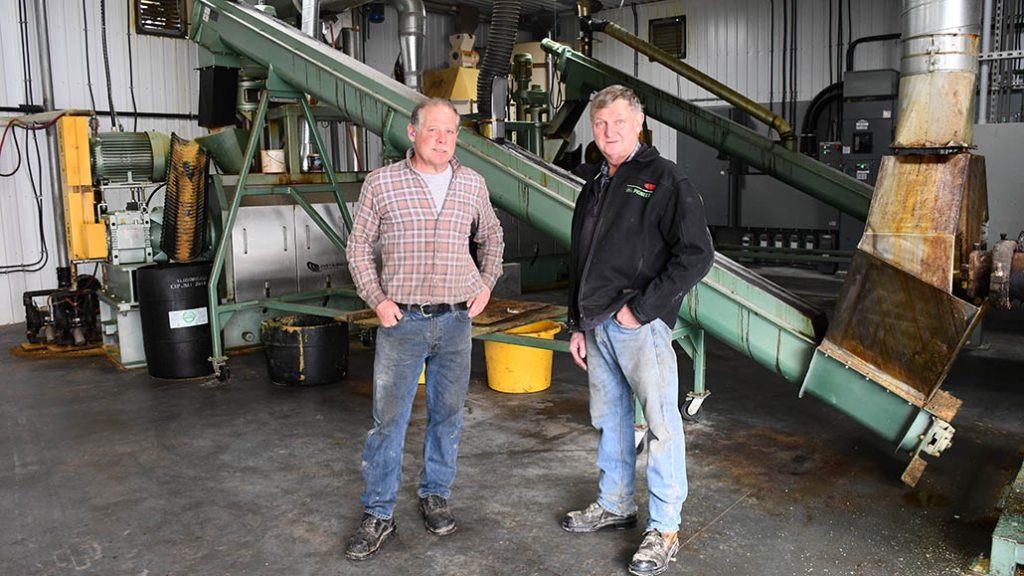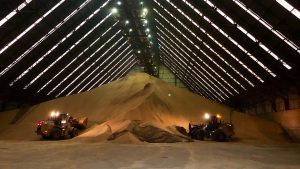A new venture
ADDING VALUE TO THE LOCAL MARKET

IF RON HORST and Tim Roth have learned anything in the past year, it’s that operating a small-scale soybean crush facility isn’t as straight forward as it might seem. The long-time friends began producing soy meal and oil at Specialty Soy Inc. in New Hamburg in June 2018.
They set up their equipment inside an existing building at Horst’s farm — right across the laneway from the family-owned Stoneybrook Elevators (now operated by Horst’s daughter and son-in-law).
“We were looking to add value to the soybeans that were coming into the elevator instead of just trucking them out,” says Horst. “As a start-up you expect some problems, but we’ve had a number of issues and haven’t worked through all of them yet.”
PRODUCTION CHALLENGES
At the top of the list, is the need to solve their gum problem. The ‘gum’ is phospholipids in the soy oil, and local feed mills are hesitant to use it because it can create a problem in their production line. Currently, the oil is shipped to the U.S. and Quebec, where further processing is done.
“We can keep our meal price more competitive if we get a better price for our oil, but to do that we need to figure out our gum problem,” says Horst.
That means they need to figure out how to further refine their oil, but so far, they haven’t found a cost-effective solution that works for them. Specialty Soy’s use of a mechanical process is what creates the gum problem, in large-scale commercial facilities, a solvent extraction process is used to separate the oil, altering the process.
Horst and Roth have had success with selling their meal to local feed mills and directly to dairy and livestock operations with positive feedback.
“The dairy farmers have told us that including our meal in their rations has led to better digestion and an increase in milk production,” says Roth.
Their facility runs 10 hours a day during the week and processes about 125 to 150 tons of soybeans every week, which makes about 100 tons of meal. Currently, they have two storage tanks which allow them to store about nine days worth of oil production. Oil is shipped out about once a week. Future plans for 24-hour production will increase how often they ship out their product to meet market demand.
For now, Horst and Roth are happy with how things are running at their current size. However, they are looking to expand with a move to a new location that will allow them to build a larger facility. They are also hoping a move will allow them to run off natural gas. The rural location of Specialty Soy means they don’t have access to three phase power and instead currently rely on a diesel generator. But even if three phase power was available, they question if it is dependable enough to run their equipment.
“We have to constantly monitor the equipment, it’s very temperamental,” says Roth. “Because we use a mechanical process, the extruders and presses need to be shut down in a specific order. If the power goes out, or we get even just a blink in the power supply, we have to spend hours taking the equipment apart to get it to restart.”
Horst and Roth have already had one potential spot fall through, but they have their eye on another place nearby that could have the right infrastructure. One thing they don’t have to worry about is a lack of support from their local township. Roth says the township has been eager to support their plans and they have worked with them to review zoning and other logistics.
OPPORTUNITIES
Currently, the majority of Canadian soybeans are processed at crush plants located in Hamilton (Bunge), Windsor (ADM), and Beaconcour, QC (TRT/Glencore). These large companies convert one bushel (60 lbs) of soybeans into about 44 lbs of meal and approximately 11 lbs of oil. The remainder is things like hulls that can be reblended into the meal if chosen to or sold separately. Soybean oil has a wide range of food and industrial uses and drives 30 to 40 per cent of the value of a soybean.
Small scale processing, like that done at Specialty Soy, offers potential in Ontario. The high heat extrusion process without the use of chemicals allows them to serve a local market using locally grown soybeans.
“To see farmers taking on this initiative themselves is a great thing. The more value-add we are able to provide the more opportunities that are going to become available for Ontario grain. We are competing against large players like the United States and South America and anyway that we can provide value-add, especially if it can come directly from the farm, is going to lead to more market opportunities for Ontario grain,” says Nicole Mackellar, manager of market development for Grain Farmers of Ontario.
Horst and Roth currently process crush beans, they haven’t ventured into non-GMO or IP beans, but it is on their radar.
“Economics will drive whether we get into non-GMO,” says Roth. “Some mills do want the product, but we would have to clean out in between runs and process a large enough amount to make that worthwhile, so for now we are better off to go all one way.”
In the future though, they know it’s an opportunity they can pursue. For now, they are focussed on their expansion plans, building their customer base, and providing a consistent, high-quality, chemical-free product.
“We have learned so much here. If we had started with a larger facility we would have made bigger mistakes. Now we have the knowledge we need to confidently expand,” says Horst.
For more information on Specialty Soy Inc.: Ron Horst and Tim Roth: 519-625-8331 or specialtysoy@netflash.net. •



























